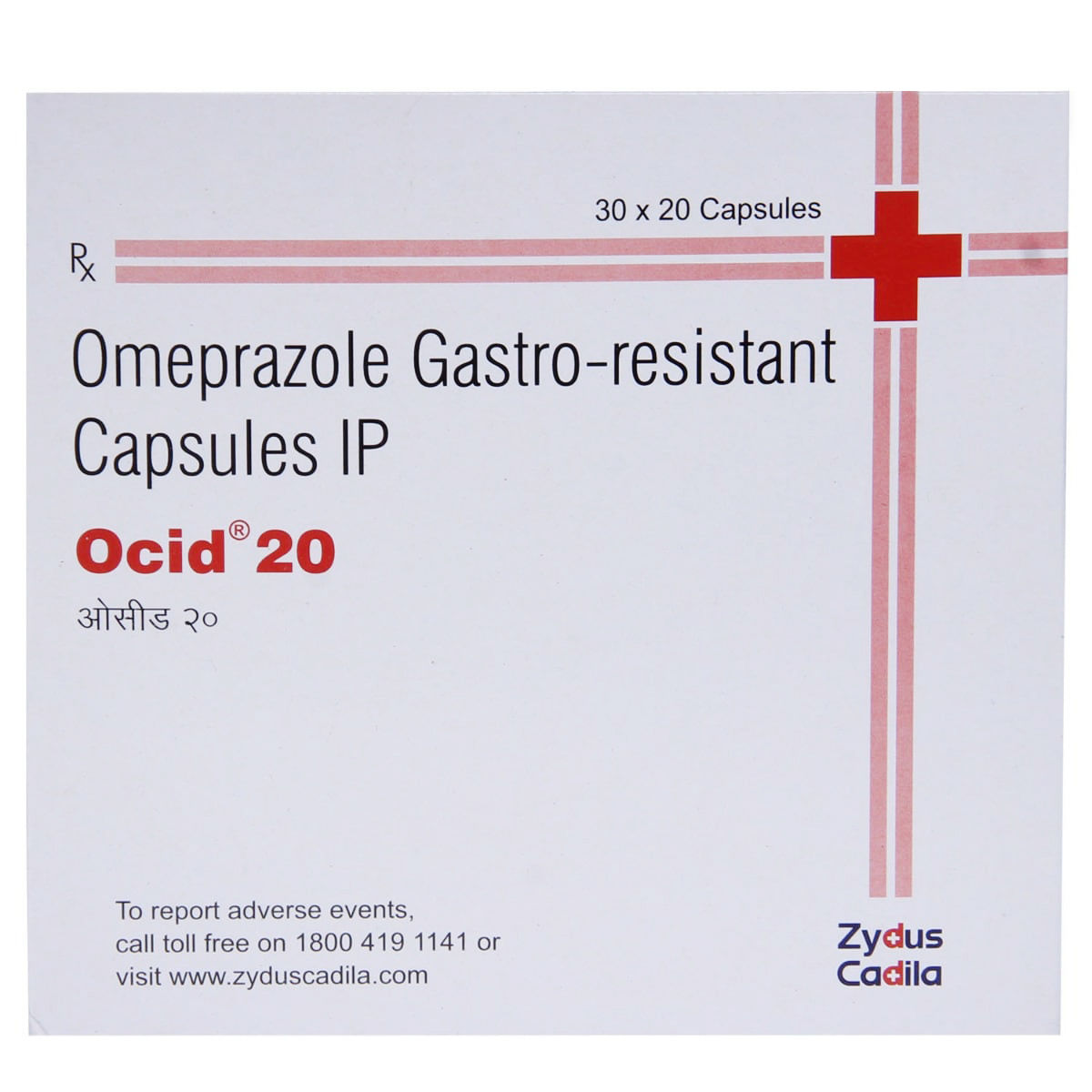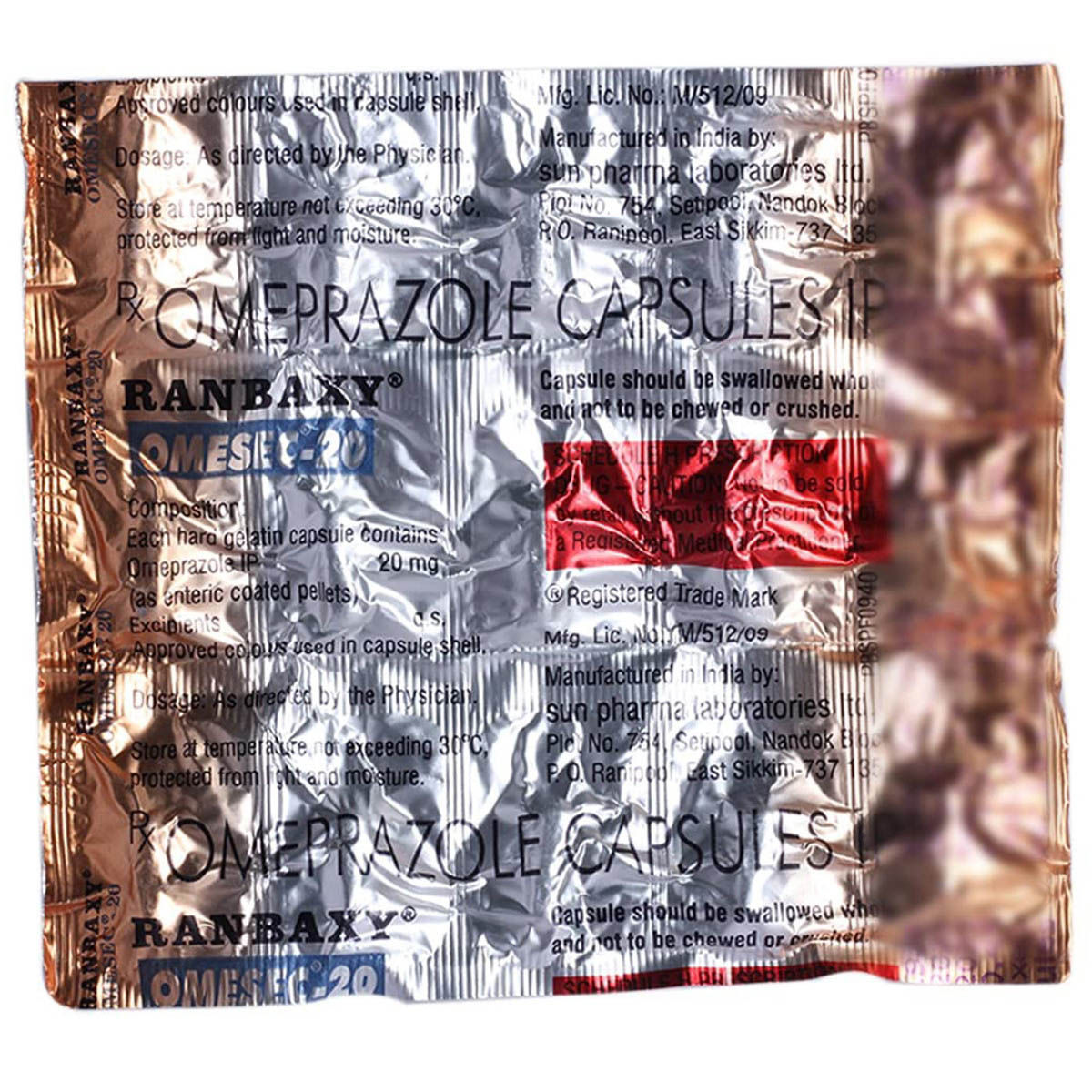Medo 20 Capsule

₹46
(Inclusive of all Taxes)
₹6.9 Cashback (15%)
Medo 20 Capsule is used to treat gastroesophageal reflux disease (GERD), peptic ulcer (stomach or duodenal ulcer), and Zollinger-Ellison syndrome (overproduction of acid due to a pancreatic tumour). It contains Omeprazole, which helps reduce stomach acid and relieves symptoms of food pipe lining inflammation (esophagitis), acid reflux, or heartburn. It may cause common side effects such as stomach pain, gas formation (flatulence), nausea, vomiting, diarrhoea, and headache. Before taking this medicine, you should tell your doctor if you are allergic to any of its components or if you are pregnant/breastfeeding, and about all the medications you are taking and any pre-existing medical conditions.
Know Your Delivery Time
Provide Delivery Location
 Prescription drug
Prescription drugWhats That

Secure Payment

India's Most Trusted Pharmacy

Genuine Products
About Medo 20 Capsule
Medo 20 Capsule belongs to the class of drugs known as proton pump inhibitors (PPIs) used to treat gastroesophageal reflux disease (GERD), peptic ulcer (stomach or duodenal ulcer), and Zollinger-Ellison syndrome (overproduction of acid due to a pancreatic tumour). Normally, a thick layer of mucous protects the stomach against its own acid secretion. But, in the long run, it gets eroded by excessive stomach acid production, leading to complications like GERD, peptic ulcer, and Zollinger-Ellison syndrome.
Medo 20 Capsule contains omeprazole (a proton pump inhibitor), which helps reduce stomach acid by blocking the actions of an enzyme called H+/K+ ATPase (gastric proton pump). This proton pump lies in the stomach wall cells and is responsible for releasing gastric acid. Medo 20 Capsule prevents the release of stomach acid and relieves symptoms such as food pipe lining inflammation (esophagitis), acid reflux, or heartburn.
Your doctor will decide the dose and duration of Medo 20 Capsule based on your medical condition. Medo 20 Capsule may cause common side effects like stomach pain, gas formation (flatulence), nausea, vomiting, diarrhoea, and headache. These side effects are temporary and may resolve on their own. However, if the side effects persist or worsen, consult your doctor.
Before taking Medo 20 Capsule, inform your doctor if you are allergic to any of its components or to other proton pump inhibitors. Also, tell your doctor if you have stomach or intestinal cancer, severe liver problems, difficulty swallowing, bloody or black stools, unexplained weight loss, or will have an endoscopy in the future. Medo 20 Capsule should not be given to patients suffering from Clostridium difficile-associated diarrhoea. Avoid prolonged use of Medo 20 Capsule, as it may increase the risk of osteoporosis-related fractures of the hip, wrist, or spine due to loss of magnesium. Consult your doctor before taking Medo 20 Capsule if you are pregnant or breastfeeding.
Uses of Medo 20 Capsule
Medo 20 Capsule is used to reduce the amount of acid your stomach produces. It is commonly prescribed to treat:
- Gastroesophageal Reflux Disease (GERD) – a condition where stomach acid flows back into the esophagus, causing heartburn and discomfort.
- Peptic Ulcers – sores in the lining of the stomach or the upper part of the small intestine (duodenum), often caused by Helicobacter pylori infection or non-steroidal anti-inflammatory drugs (NSAIDs).
- Zollinger-Ellison Syndrome – a rare condition in which tumors in the pancreas or duodenum cause the stomach to produce too much acid.
- Erosive Esophagitis – helps heal damage to the esophagus caused by stomach acid and prevents it from returning.
- Symptom Relief – reduces common symptoms like heartburn, bloating, and stomach pain by lowering acid levels.
- Bleeding Prevention – reduces the risk of upper digestive tract bleeding in critically ill patients by protecting the stomach and esophagus lining.
Directions for Use
- Medo 20 Capsule can be taken with or without food. However, it is recommended to take it 30-60 minutes before a meal, preferably in the morning, for optimal effectiveness.
- It is typically administered once daily, but your doctor will determine the exact dose and timing based on your specific medical condition.
- Swallow it as a whole with a glass of water.
- Do not crush, chew, break, or open it.
Medicinal Benefits
Medo 20 Capsule is effective in relieving symptoms of gastroesophageal reflux disease (heartburn), Zollinger-Ellison syndrome, and peptic ulcers (stomach or duodenal ulcers), as well as healing erosive esophagitis (inflammation of the food pipe). Medo 20 Capsule contains omeprazole, which works by irreversibly blocking the proton pump gate (which secretes stomach acid).
How Medo 20 Capsule Works
Storage
What if I have taken an overdose of Medo 20 Capsule
Drug Warnings
Do not take Medo 20 Capsule if you are allergic to any of its components, other proton pump inhibitors, or if you are taking medications for HIV such as nelfinavir. Inform your doctor if you have stomach or intestinal cancer, severe liver problems, difficulty swallowing, bloody or black stools, unexplained weight loss, hypomagnesemia (low blood magnesium levels), stomach problems (such as pain or indigestion), or will have an endoscopy in the future. Medo 20 Capsule should not be given to patients suffering from Clostridium difficile-associated diarrhoea. Avoid prolonged use of Medo 20 Capsule, as it may increase the risk of osteoporosis-related fractures of the hip, wrist, or spine due to loss of magnesium. Consult your doctor before taking Medo 20 Capsule if you are pregnant or breastfeeding. Medo 20 Capsule should not be given to children under 1 year of age.
Diet & Lifestyle Advise
- Avoid intake of acid or heartburn-triggering foods or drinks like onions, peppermint, chocolate, caffeinated beverages, citrus fruits or juices, tomatoes, and high-fat and spicy foods.
- Before going to sleep, try to raise your bedhead so that your head and chest are higher than your feet. Do not use piles of pillows; instead, one raised block is fine. This will not allow the stomach acid to backflow through your food pipe.
- Avoid taking alcohol and smoking cigarettes. Alcohol can raise the level of production of stomach acid, leading to heartburn and acid reflux. On the other hand, nicotine smoking damages the valve (sphincter) which prevents backflow of the stomach acid back into the food pipe.
- Include high-fibre containing foods, berries, cherries, leafy green veggies (kale, spinach), and black peppers in your meal. These foods are full of antioxidants, calcium, and vitamin B12 that can help cope with the long-term effects of the medicine. Fermented dairy products like miso, sauerkraut, and kimchi contain probiotics which help in the prevention of excess stomach acid production. Cranberry juice can be beneficial in peptic ulcer and H. pylori infection.
- Avoid sitting continuously, as it can increase stomach acid production. Try to take a break of 5 minutes in 1 hour by brisk walking or stretching.
Habit Forming
Therapeutic Class
Product Substitutes
Alcohol
Caution
Drinking alcohol with Medo 20 Capsule may cause dehydration and elevate the level of stomach acid, thereby decreasing its efficiency. So, try to avoid or limit alcohol and contact the doctor before intake of Medo 20 Capsule.
Pregnancy
Caution
It is unknown whether Medo 20 Capsule affects the baby or not. Please consult your doctor before taking Medo 20 Capsule if you are pregnant or planning to become pregnant. Your doctor will weigh the benefits and any potential risks before prescribing it to you.
Breast Feeding
Caution
It is unknown whether Medo 20 Capsule passes into the breast milk. Please consult your doctor before taking Medo 20 Capsule if you are breastfeeding. Your doctor will weigh the benefits and any potential risks before prescribing it to you.
Driving
Caution
In some cases, Medo 20 Capsule may cause dizziness, sleepiness, or blurred vision. If you experience these symptoms, refrain from driving or operating heavy machinery until you have fully recovered.
Liver
Caution
Medo 20 Capsule should be taken with caution, especially if you have a history of liver diseases/conditions. Your doctor may adjust your dose depending on your medical condition.
Kidney
Caution
Medo 20 Capsule should be taken with caution, especially if you have a history of kidney diseases/conditions. Your doctor may adjust your dose depending on your medical condition.
Children
Caution
Medo 20 Capsule should not be given to children under 1 year of age. Medo 20 Capsule is generally safe to use in children over 1 year when prescribed by a doctor.

Have a query?
FAQs
Medo 20 Capsule is used to treat gastroesophageal reflux disease (GERD), peptic ulcer (stomach or duodenal ulcer), and Zollinger-Ellison syndrome (overproduction of acid due to a pancreatic tumour).
Medo 20 Capsule contains omeprazole (a proton pump inhibitor), which helps reduce stomach acid by blocking the action of an enzyme called H+/K+ ATPase (the gastric proton pump). This proton pump lies in the stomach wall cells, is responsible for releasing gastric acid. Medo 20 Capsule prevents the release of stomach acid and relieves symptoms such as food pipe lining inflammation (esophagitis), acid reflux, or heartburn.
Prolonged intake of Medo 20 Capsule may lead to atrophic gastritis (inflammation of stomach cells), vitamin B12 deficiency, and weakening of bones or osteoporosis (loss of calcium, magnesium, and vitamin D). Your doctor may prescribe calcium, vitamin D, or haemoglobin-enhancing medications to cope with long-term side effects.
No. Medo 20 Capsule is not prescribed for stomach cancer. Medo 20 Capsule is only indicated for the treatment of hyperacidity, acid reflux symptoms (GERD), heartburn and Zollinger-Ellison syndrome.
No. Gas and acidity are two different common discomforts. Acidity is caused when improper functioning of the valve (sphincter) is located at the junction of the stomach and food pipe. As a result, stomach acid backflows and enters the upper part of the food pipe, causing heartburn. On the other hand, gas is the result of the digestion of food and drinks, eliminating gases like carbon dioxide, hydrogen, nitrogen, methane, etc., from the body.
Yes. Medo 20 Capsule can alter certain medical tests like neuroendocrine tumours (secretin stimulation test) and urine screening tests for tetrahydrocannabinol (THC). So before undergoing such diagnostic tests, contact your doctor.
No. Medo 20 Capsule prevents the excessive production of stomach acid, which can cause acid reflux and heartburn. If you notice blood in your stool or mucous, immediately contact the doctor.
Medo 20 Capsule can be taken with or without food. However, it is recommended to take it 30-60 minutes before a meal, preferably in the morning, for optimal effectiveness.
Yes, you can take Medo 20 Capsule with domperidone, however it should be taken only of recommended by the doctor.
Before taking any medication, including Medo 20 Capsule, it's important to consult with a doctor. They can assess your individual needs and provide customised advice. Follow the instructions provided by your healthcare professional and be aware of potential adverse effects. If you have any concerns, don't hesitate to ask for clarification.
Diarrhea is a possible side effect of omeprazole. It's often mild and short-lived, but if it's severe or accompanied by other symptoms, please see your doctor.
The duration of omeprazole treatment is individualised and depends on your specific condition and response to the medication.
Omeprazole can increase the risk of calcium deficiency and osteoporosis if taken for a long time. This is because it can interfere with calcium absorption. If you're taking omeprazole for a long time, talk to your doctor about the risks and benefits.
Yes, long-term use of Medo 20 Capsule may increase the risk of vitamin deficiencies, particularly vitamin B12. If you have any concerns or face any adverse effects related to vitamin deficiencies, please consult your doctor.
The decision to prescribe omeprazole to cardiac patients should be made on an individual basis, taking into account their medical history and associated risk factors.
Swallow Medo 20 Capsule as a whole with a glass of water; do not crush, chew, break, or open it.
Medo 20 Capsule may cause common side effects, such as stomach pain, gas formation (flatulence), nausea, vomiting, diarrhoea, and headache. These side effects are temporary and may resolve themselves over time. However, if the side effects persist or worsen, contact the doctor.
Before taking Medo 20 Capsule, please inform your doctor about all your medical conditions, sensitivities, and all medications you are currently using. And tell your doctor if you are pregnant, planning to become pregnant, or breastfeeding.
Yes, Medo 20 Capsule can interact with other medications. It's important to inform your doctor about all the medications you're taking, including prescription medications, over-the-counter drugs and herbal supplements.
Country of origin
Disclaimer
Author Details
We provide you with authentic, trustworthy and relevant information
Reference
- https://www.drugs.com/omeprazole.html
- https://medlineplus.gov/druginfo/meds/a693050.html
- https://assets.hpra.ie/products/Human/19006/Leaflet-2191137-11072017125746-636353746684687500.pdf
- https://rwandafda.gov.rw/wp-content/uploads/2023/03/OMLINK-20-Capsules-Omeprazole-USP-20mg-Omeprazole-Pellets-7.15-PIL.pdf
- https://www.nps.org.au/assets/medicines/928c8260-b5d1-4989-838e-a53300ff645e.pdf
- https://www.drreddys.com/media/109870/omeprazole-20mg-pil.pdf
- https://www.nhs.uk/medicines/omeprazole/
- https://www.medicines.org.uk/emc/product/663/pil
























